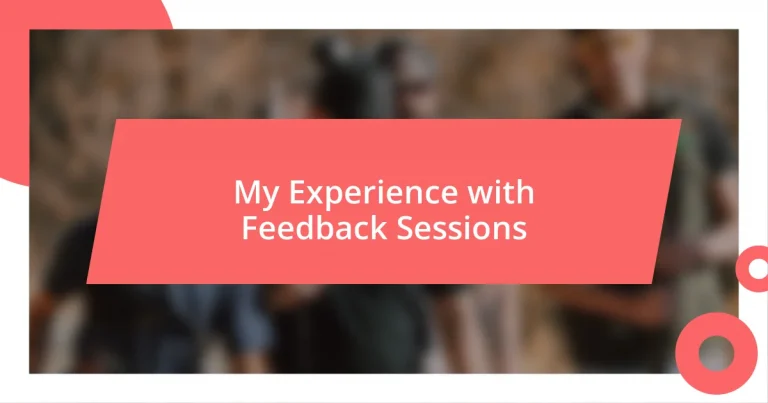Key takeaways:
- Feedback sessions facilitate open dialogue, encouraging personal and professional growth through constructive criticism and recognition of strengths.
- Effective preparation and goal setting for feedback sessions enhance clarity and purpose, transforming anxiety into anticipation.
- Following up after feedback, documenting progress, and celebrating small victories fosters accountability and reinforces continuous improvement.
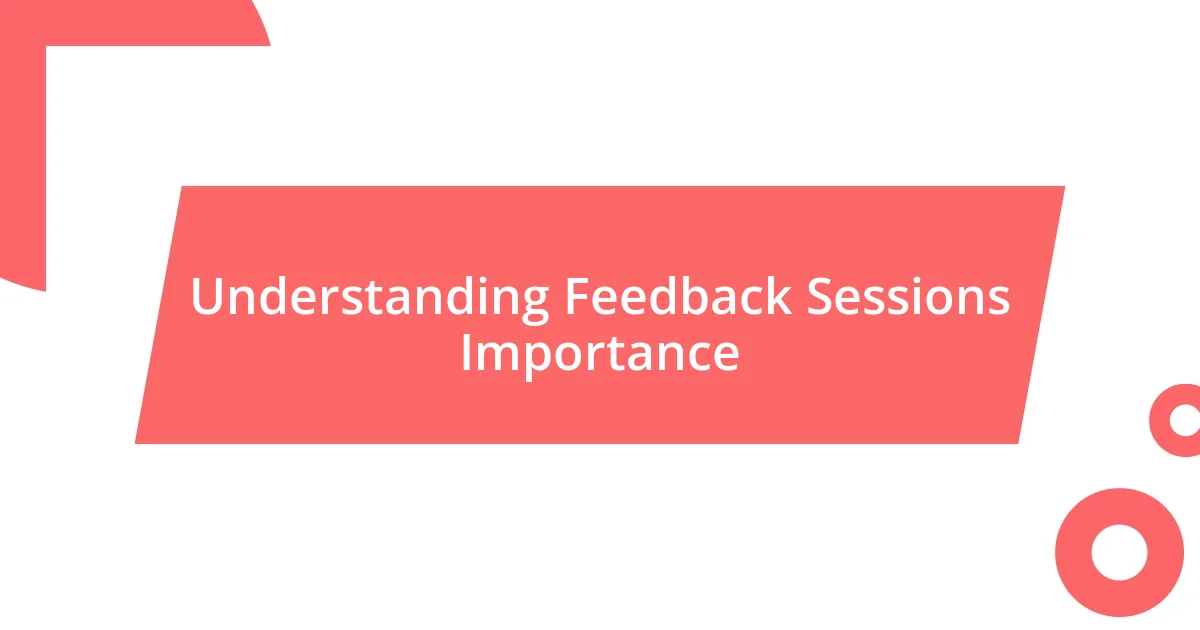
Understanding Feedback Sessions Importance
Feedback sessions are crucial because they create a space for open dialogue; I’ve learned this firsthand during my early career. I still remember the anxiety I felt before my first feedback session, questioning whether I was good enough. However, that conversation transformed my approach to work. It wasn’t just about receiving criticism; it was about understanding different perspectives that helped me grow.
These sessions offer an opportunity to pinpoint areas of improvement while also celebrating successes. Reflecting on one particular feedback session, I found myself surprised at how acknowledging my strengths was just as vital as addressing my weaknesses. Isn’t it fascinating how constructive criticism can lead to deeper insights when framed positively?
Moreover, feedback fosters a culture of continuous learning. Imagine a team where everyone feels empowered to share their thoughts openly—doesn’t that sound like a dream? I’ve witnessed the shift in my own teams when feedback becomes a regular practice; it’s amazing how collaboration flourishes when everyone commits to supporting one another.
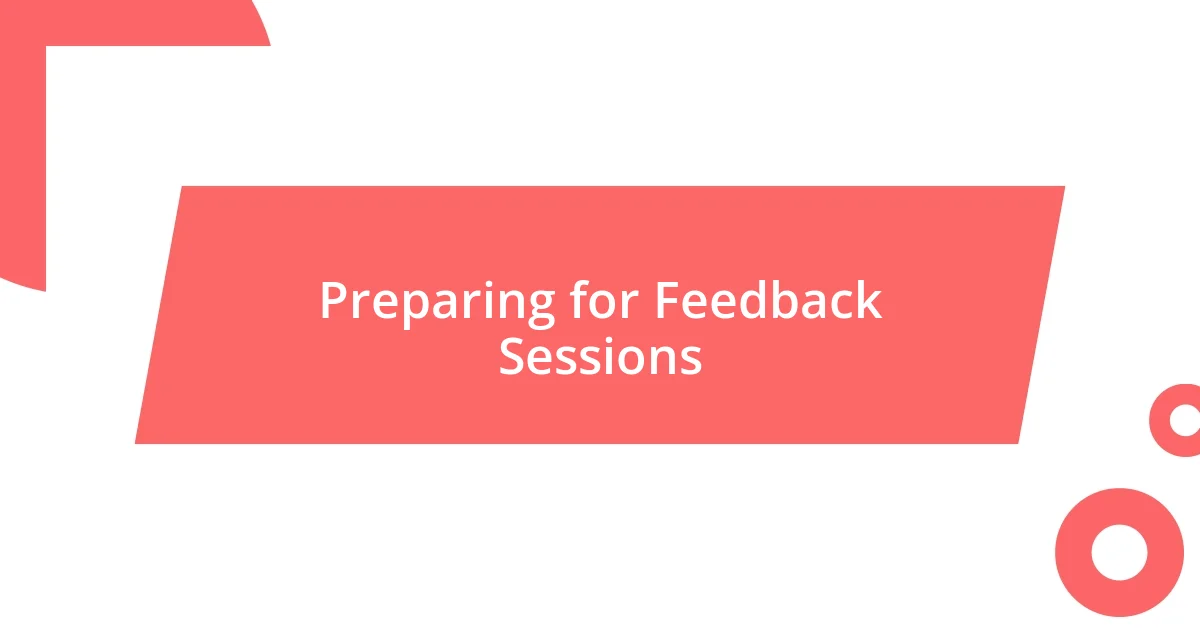
Preparing for Feedback Sessions
Preparing for feedback sessions can be a nerve-wracking experience, but I’ve learned that the right preparation transforms those feelings into excitement. When I began creating structured notes of what I wanted to discuss, including both my achievements and areas for improvement, I felt more in control. This simple act of organizing my thoughts shifted my mindset and turned my anxiety into anticipation.
I also realized that setting clear objectives for the session greatly enhances the experience. Before one particular session, I aimed to understand how to improve my collaboration skills. As I walked into that room, I could feel my heart racing, but having a specific goal helped me focus. Reflecting on that instance, I’d say it felt empowering to approach feedback with purpose.
One important aspect of preparation is to anticipate feedback from others. During my early days, I would focus solely on what my supervisor might say to me, but I soon discovered that preparing to give feedback in return was equally beneficial. I remember a session where I expressed appreciation for my colleague’s contributions, which fostered a more open dialogue. It’s like a dance—recognizing that both parties play a role can lead to a more enriching experience.
| Preparation Elements | Benefits |
|---|---|
| Organizing Notes | Reduces anxiety and increases focus |
| Setting Objectives | Enhances clarity and purpose |
| Anticipating Feedback | Fosters open dialogue and collaboration |
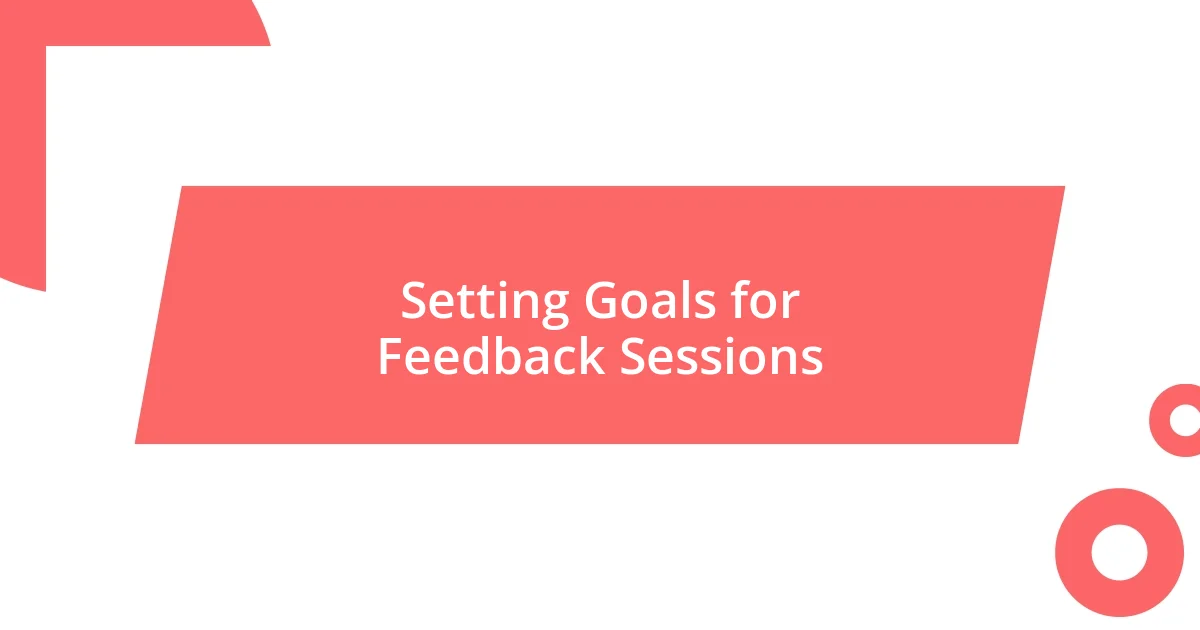
Setting Goals for Feedback Sessions
Setting clear goals for feedback sessions is essential. I’ve learned that without focused objectives, a session can easily become a scattered conversation, losing its potential impact. For example, I remember a time when I entered a feedback session with a vague idea of what I wanted. As a result, I left feeling more confused than enlightened. Since then, I always jot down specific targets before I meet, which not only helps me stay on track but also ensures that I walk away with actionable insights.
When setting goals, it can be helpful to consider a few key elements:
- Specificity: Define clear goals that are easy to understand.
- Measurable Outcomes: Identify what success looks like by establishing criteria you can evaluate later.
- Relevance: Ensure your goals align with broader personal or professional development plans.
- Time-Bound: Set a timeline to help keep the momentum going post-session.
By framing my goals this way, I find myself approaching feedback sessions as an engaging conversation, rather than a daunting obligation. Each time I enter with a clearer mindset, I genuinely look forward to the exchange. The anticipation of targeted feedback turns those nervous butterflies into a motivating force, driving me further along my journey of growth.
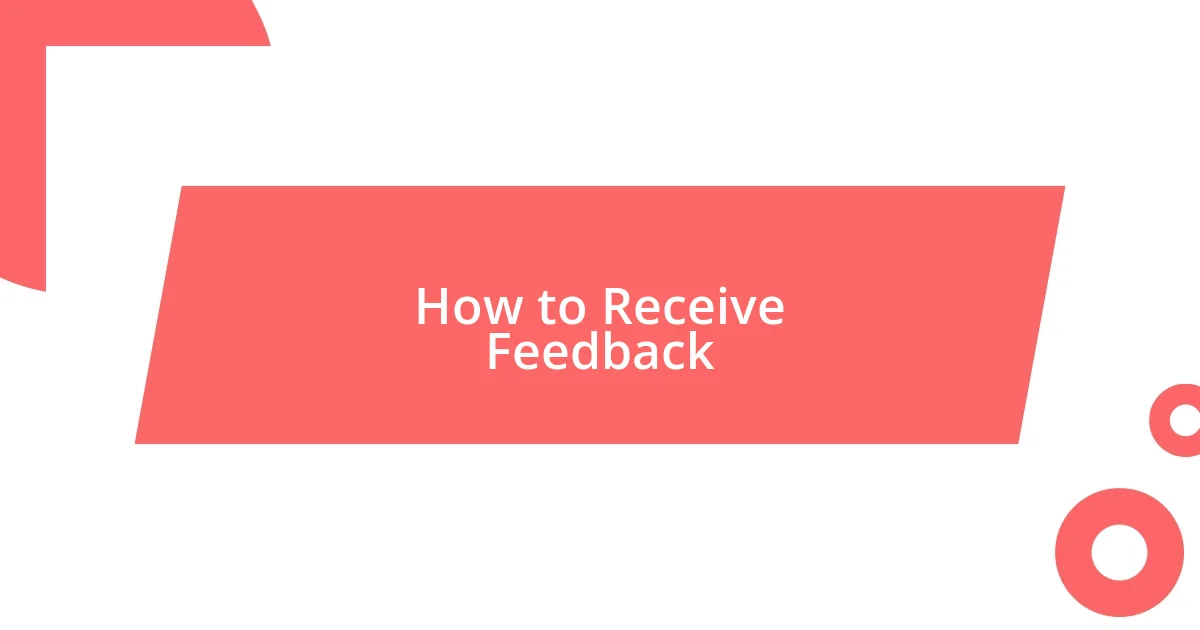
How to Receive Feedback
Receiving feedback can be a delicate experience, but I’ve found that embracing it with an open mindset truly transforms my perspective. I often ask myself, “What can I learn from this?” This simple question has shifted my focus from defensiveness to curiosity. I vividly recall a moment when my manager pointed out my presentation style. Initially, I felt a pang of embarrassment, but I took a deep breath and thought, “This is a chance to grow.” That shift in mindset allowed me to absorb the feedback constructively.
When receiving feedback, it’s also crucial to practice active listening. I make it a point to nod and maintain eye contact, signaling that I’m fully engaged. I remember one session where I was so eager to respond that I interrupted my peer. Later, I realized how ineffective that was. By dedicating my attention fully to the feedback, I not only show respect but also catch nuances that might otherwise slip by. Isn’t it fascinating how a simple act of listening can lead to deeper understanding?
Finally, it helps to reflect on the feedback afterward. I usually jot down key points and my reactions to them right after the session. This practice allows me to process my feelings and avoid the common pitfall of letting my emotions cloud my judgment. One instance comes to mind where I received praise for my teamwork skills but was also nudged to take on more leadership roles. At first, I was apprehensive, but by giving myself time to meditate on that feedback, I felt empowered to step out of my comfort zone. Have you ever felt like you were on the brink of something new but just needed a little push? That’s exactly how feedback sessions can propel us forward when approached with the right attitude.
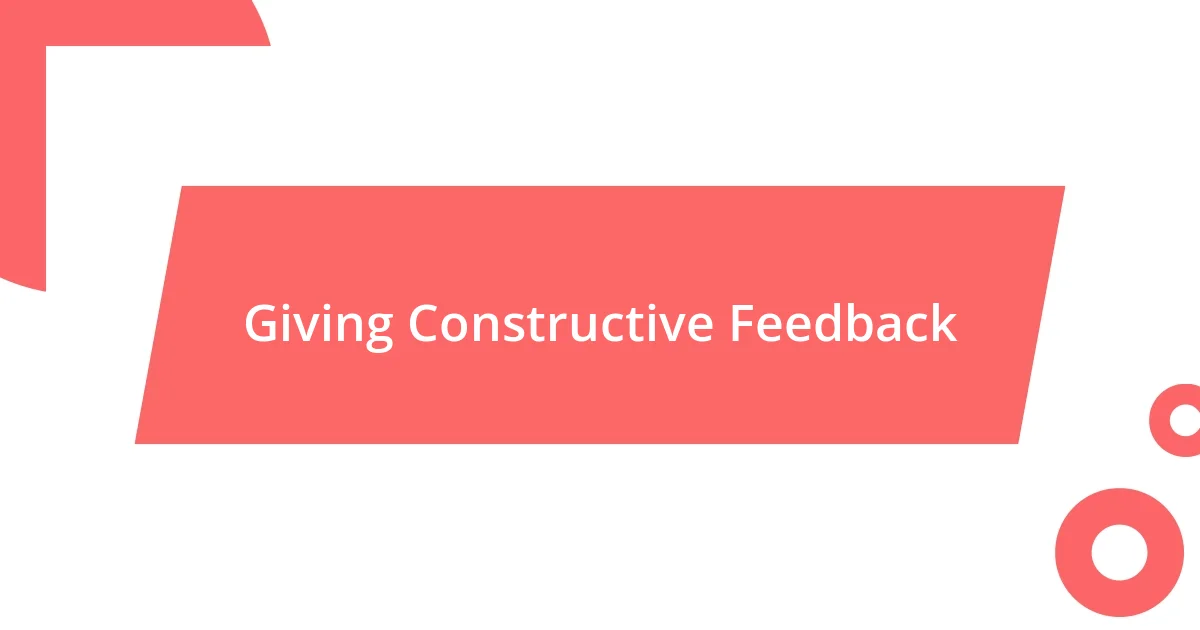
Giving Constructive Feedback
Giving constructive feedback requires a thoughtful approach that balances honesty with empathy. I remember once needing to address a colleague’s missed deadlines. Instead of diving into criticism, I started by acknowledging the quality of their work. I asked, “What challenges are you facing with time management?” This opened up a dialogue, allowing me to provide suggestions while also showing I was genuinely interested in their perspective. It’s amazing how framing feedback as a shared problem rather than assigning blame can foster collaboration.
Another aspect I’ve learned is to focus on the behavior, not the person. During a feedback session with a team member, I noticed they often interrupted others. Rather than labeling them as rude, I pointed out specific instances and asked how they felt about the dynamic of the team discussions. It was eye-opening for both of us! This method not only minimizes defensiveness but also helps the person see how their actions impact the team. Have you ever noticed how shifting the language can transform the energy in a conversation?
I’ve also found that timing can greatly influence the effectiveness of constructive feedback. For example, giving feedback right after a project could feel rushed; emotions run high, and clarity can suffer. I prefer to wait a day or two, allowing myself and the recipient to process the experience. By then, I’ve often found a more thoughtful way to express my thoughts. When one of my teammates missed a key project milestone, waiting a bit helped me gather my thoughts and present them in a manner that encouraged growth rather than defensiveness. How often do you think about the right moment to share your insights? Finding that sweet spot makes all the difference!
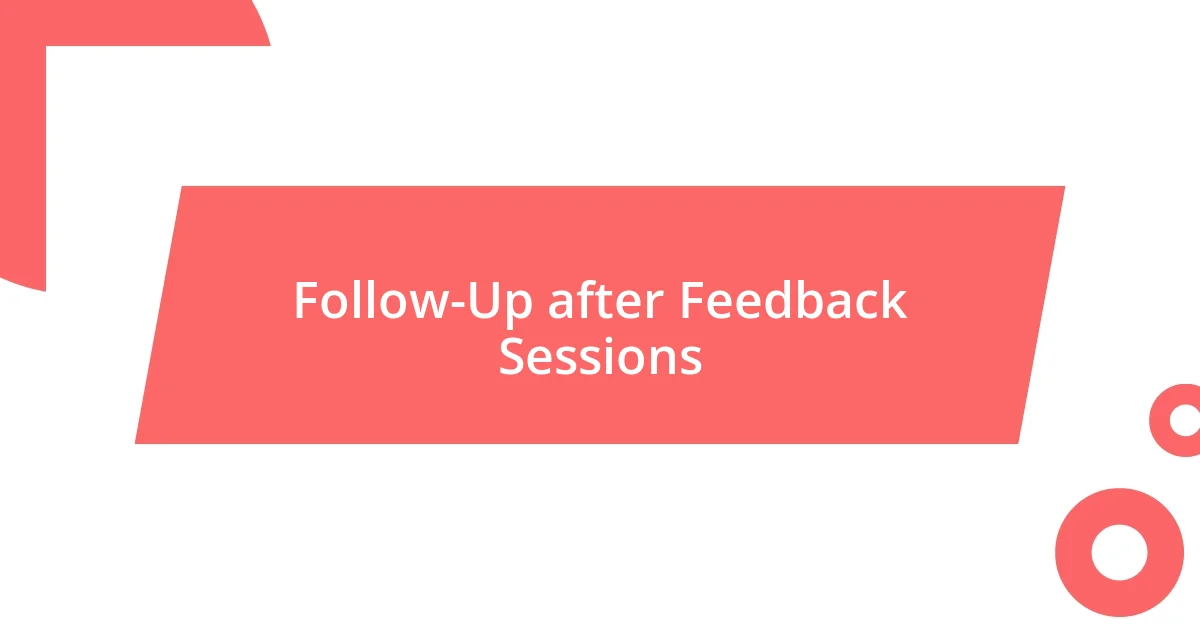
Follow-Up after Feedback Sessions
Following up after a feedback session can significantly deepen the experience for both parties involved. After I’ve received feedback, I make it a point to reach out to the person who provided it, usually within a day or two. I express my gratitude for their insights and share a few specific ways I’m planning to implement their suggestions. Recently, after a session where feedback centered on my project management approach, I sent a quick thank-you note explaining how I intended to adjust my strategies moving forward. It’s rewarding because I can see their impact in real-time.
I also believe in revisiting the feedback a few weeks later. Checking in allows me to demonstrate accountability for the adjustments I’ve made. For instance, during my last project, I followed up with my mentor about the leadership skills I was encouraged to develop. When I recounted my experiences since we last spoke, not only did it reaffirm my growth, but it also opened up further discussion about additional resources or practices I could explore. Have you ever noticed how these conversations help solidify what you’ve learned?
Finally, I find that documenting my progress and reflections helps me track my development over time. Whenever I act on feedback, I jot down the steps I took and the outcomes that resulted. This has proven invaluable as I assess my growth trajectory. It’s fascinating how seeing your evolution laid out vividly can boost your confidence. Have you ever looked back at your journey and realized just how far you’ve come? Following up isn’t just about the immediate next steps; it’s about nurturing a continuous growth mindset.
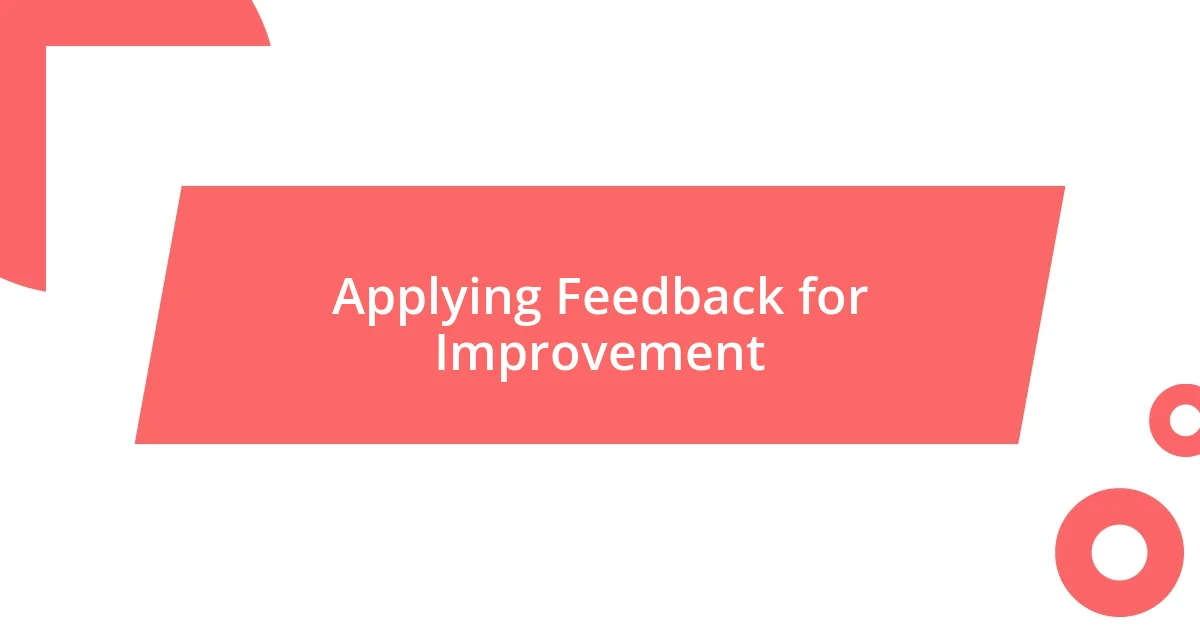
Applying Feedback for Improvement
When it comes to applying feedback for improvement, I’ve learned it’s crucial to take action quickly. I remember receiving feedback on my presentation style, where I struggled with pacing. Instead of letting time slip by, I immediately incorporated exercises to practice speaking more deliberately. Just a few days later, my confidence blossomed during my next presentation. It’s almost like a light bulb went off—have you ever experienced that invigorating rush that comes from acting on constructive criticism right away?
Additionally, I find it incredibly beneficial to discuss feedback with a trusted colleague or mentor. After I received some tough but fair points about my report writing, I invited a friend for coffee to dive deeper into the suggestions. We mapped out a plan together, and I witnessed how different perspectives can illuminate new strategies. It took that feedback from feeling daunting to being a collaborative project. How often do you seek support when trying to implement feedback? You might be surprised at the fresh insights you gain!
Lastly, celebrating small victories while applying feedback really helps maintain motivation. I once applied feedback on my time management skills by using a planner more effectively. Each week I marked off little milestones—like completing tasks ahead of schedule or finishing projects early. Sharing these wins with my team not only boosted my morale but also inspired others to follow suit. What little victories could you recognize in your feedback journey? Acknowledging progress keeps the momentum going and makes the improvement process feel rewarding rather than overwhelming.












